PhD Student and Supervisor Resources
Διομήδης Σπινέλλης
Τμήμα Διοικητικής Επιστήμης και Τεχνολογίας
Οικονομικό Πανεπιστήμιο Αθηνών
dds@aueb.gr
A Reading List for PhD Students (and their Supervisors)
- Phil Agre. Networking on the network: A guide to professional skills for PhD students. Available online http://dlis.gseis.ucla.edu/people/pagre/network.html (http://dlis.gseis.ucla.edu/people/pagre/network.html). Current January 2003, August 2002.
- Steven Alter and Alan R. Dennis. Selecting research topics: Personal experiences and speculations for the future. Communications of the Association for Information Systems, 8:314–329, 2002.
- Vance W. Berger and John P. A. Ioannidis. The Decameron of poor research. British Medical Journal, 329(7480):1436–1440, December 2004. (doi:10.1136/bmj.329.7480.1436 (http://dx.doi.org/10.1136/bmj.329.7480.1436))
- John W. Chinneck. How to organize your thesis. Available online http://www.sce.carleton.ca/faculty/chinneck/thesis.html (http://www.sce.carleton.ca/faculty/chinneck/thesis.html). Current November 2005.
- Claire Kehrwald Cook. Line by Line. Houghton Mifflin, Boston, MA, 1986.
- Gordon B. Davis. Advising and supervising doctoral students: Lessons I have learned. MISRC Working Paper 04-12, University of Minnesota. MIS Research Center, May 2004. Forthcoming as chapter in PhD Supervisors and Student Handbook for Information Systems Research, Butterworth-Heinnemann, 2004.
- Robert A. Day. How to write a scientific paper. IEEE Transactions on Professional Communication, PC-20(1):32–37, June 1977.
- A.R. Dennis and J.S. Valacich. Conducting research in information systems. Communications of AIS, 7(5), 2001. (doi:10.17705/1CAIS.00705 (http://dx.doi.org/10.17705/1CAIS.00705))
- R. Farrow, F. Iniesto, M. Weller, and R. Pitt. The GO-GN Research Methods Handbook. Open Education Research Hub. The Open University, Buckingham, UK, 2020.
- Hugh Gallagher. An exemplary college application essay. Available online http://www.ifs.tuwien.ac.at/ silvia/research-tips/ (http://www.ifs.tuwien.ac.at/~silvia/research-tips/). Current November 2005, 1990.
- William Germano. The scholarly lecture: How to stand and deliver. The Chronicle Review, 50(14), November 2003.
- George D. Gopen and Judith A. Swan. The science of scientific writing. American Scientist, 78(6):550–558, November 1990. Available online https://www.americanscientist.org/blog/the-long-view/the-science-of-scientific-writing (https://www.americanscientist.org/blog/the-long-view/the-science-of-scientific-writing).
- Patricia Gosling and Bart Noordam. Mastering your PhD : Survival and Success in the Doctoral Years and Beyond. Springer, New York, 2006.
- John Grimond. The Economist style guide. Also available online http://www.economist.com/research/StyleGuide/ (http://www.economist.com/research/StyleGuide/)., 2005.
- John Grossman, editor. The Chicago Manual of Style. The University of Chicago Press, Chicago and London, fourteenth edition, 1993.
- Philip Guo. The Ph.D. grind (http://pgbovine.net/PhD-memoir.htm). Available online http://pgbovine.net/PhD-memoir.htm (http://pgbovine.net/PhD-memoir.htm). Current January 2020, 2012.
- Richard W. Hamming. You and your research. Available online via a Google search, March 1986. Bell Communications Research Colloquium Seminar.
- A. R. Hevner, S. T. March, J. Park, and S. Ram. Design science in information systems research. MIS Quarterly, 28(1):75–105, 2004.
- Ralph E. Johnson, Kent Beck, Grady Booch, William Cook, Richard Gabriel, and Rebecca Wirfs-Brock. How to get a paper accepted at OOPSLA (panel). In Proceedings of the Eighth Annual Conference on Object-Oriented Programming Systems, Languages, and Applications, OOPSLA â93, page 429â436, New York, NY, USA, 1993. Association for Computing Machinery. (doi:10.1145/165854.165934 (http://dx.doi.org/10.1145/165854.165934))
- Simon L. Peyton Jones, John Hughes, and John Launchbury. How to give a great research talk. Available online http://www.ifs.tuwien.ac.at/ silvia/research-tips/Giving%20a%20talk.pdf (http://www.ifs.tuwien.ac.at/~silvia/research-tips/Giving%20a%20talk.pdf). Current November 2005.
- Simon L. Peyton Jones, John Hughes, and John Launchbury. How to write a great research paper. Available online http://www.ifs.tuwien.ac.at/ silvia/research-tips/Writing%20a%20paper.pdf (http://www.ifs.tuwien.ac.at/~silvia/research-tips/Writing%20a%20paper.pdf). Current November 2005.
- Aviel William Strunk Jr. and E. B. White. The Elements of Style. Macmillan Publishing Co., New York, 1979.
- S. Katzoff. Clarity in technical reporting. Technical Report NASA SP-7010, NASA, Washington, D.C., 1964. Second edition. Available online http://techreports.larc.nasa.gov/ltrs/PDF/NASA-64-sp7010.pdf (http://techreports.larc.nasa.gov/ltrs/PDF/NASA-64-sp7010.pdf).
- Barbara Kitchenham and Stuart Charters. Guidelines for performing systematic literature reviews in software engineering. Technical Report EBSE-2007-01, School of Computer Science and Mathematics, Keele University, 2007.
- Barbara A. Kitchenham and Shari L. Pfleeger. Personal opinion surveys. In Forrest Shull, Janice Singer, and Dag I. K. Sjøberg, editors, Guide to Advanced Empirical Software Engineering, pages 63–92. Springer London, London, 2008. (doi:10.1007/978-1-84800-044-5_3 (http://dx.doi.org/10.1007/978-1-84800-044-5_3))
- Donald E. Knuth, Tracy Larrabee, and Paul M. Roberts. Mathematical writing. Available online http://jmlr.csail.mit.edu/reviewing-papers/knuth_mathematical_writing.pdf (http://jmlr.csail.mit.edu/reviewing-papers/knuth_mathematical_writing.pdf). Current January 2020, 1987.
- Markus G. Kuhn. Effective scientific electronic publishing. Available online http://www.cl.cam.ac.uk/ mgk25/publ-tips/ (http://www.cl.cam.ac.uk/~mgk25/publ-tips/). Current March 2008, 2006.
- James Lavin. Proving almost anything: a beginner's guide to a world with infinite solutions. IEEE Potentials, pages 6–7, February/March 1996.
- Adrian Lee, Carina Dennis, and Philip Campbell. Nature's guide for mentors. Nature, 447(7119):791–797, June 2007.
- Ralp Lengler and Marin J. Eppler. A periodic table of visualization methods. Available online http://www.visual-literacy.org/periodic_table/periodic_table.html (http://www.visual-literacy.org/periodic_table/periodic_table.html). Current September 2012.
- Roy Levin and David D. Redell. An evaluation of the ninth SOSP submissions -or- how (and how not) to write a good systems paper. Operating Systems Review, 17(3):35–40, July 1983.
- Jack Lynch. Guide to grammar and style. Available online http://andromeda.rutgers.edu/ jlynch/Writing/index.html (http://andromeda.rutgers.edu/~jlynch/Writing/index.html). Current September 2010.
- Marie desJardins. How to be a good graduate student / advisor. Available online http://www.cs.indiana.edu/how.2b/how.2b.html (http://www.cs.indiana.edu/how.2b/how.2b.html). Current November 2005.
- Marie desJardins. How to succeed in postgraduate study. Available online http://aerg.canberra.edu.au/jardins/t.htm (http://aerg.canberra.edu.au/jardins/t.htm). Current November 2005.
- Matthew Might. Reading for graduate students. Available online http://matt.might.net/articles/books-papers-materials-for-graduate-students/ (http://matt.might.net/articles/books-papers-materials-for-graduate-students/). Current August 2010.
- Matthew Might. Reading for graduate students. Available online http://matt.might.net/articles/ways-to-fail-a-phd/ (http://matt.might.net/articles/ways-to-fail-a-phd/). Current January 2012.
- Silvia Miksch. How to do research. Available online http://www.ifs.tuwien.ac.at/ silvia/research-tips/ (http://www.ifs.tuwien.ac.at/~silvia/research-tips/). Current November 2005, 2005.
- John Mingers. The long and winding road: Getting papers published in top journals. Communications of the Association for Information Systems, 8:330–339, 2002.
- George Orwell. Politics and the english language. Horizon, April 1946. Also available online https://www.orwellfoundation.com/the-orwell-foundation/orwell/essays-and-other-works/politics-and-the-english-language/ (https://www.orwellfoundation.com/the-orwell-foundation/orwell/essays-and-other-works/politics-and-the-english-language/).
- Ian Parberry. A guide for new referees in theoretical computer science. Information and Computation, 112(1):96–116, July 1994. (doi:10.1006/inco.1994.1053 (http://dx.doi.org/10.1006/inco.1994.1053))
- David A. Patterson. How to have a bad career in research/academia. Available online http://www.cs.utah.edu/ lepreau/osdi94/keynote/abstract.html (http://www.cs.utah.edu/~lepreau/osdi94/keynote/abstract.html) and http://www.cs.berkeley.edu/ pattrsn/talks/BadCareer.pdf (http://www.cs.berkeley.edu/~pattrsn/talks/BadCareer.pdf). Current November 2005, November 1994. Invited Talk. First Symposium on Operating Systems Design and Implementation (OSDI '94) keynote address, November 14-17, 1994 Monterey, CA.
- Randy Pausch. Really achieving your childhood dreams. Video available online http://www.youtube.com/watch?v=ji5_MqicxSo (http://www.youtube.com/watch?v=ji5_MqicxSo). Current September 2008, September 2007.
- Vern Paxson. Strategies for sound internet measurement. In Proceedings of the Internet Measurement Conference, Taormina, Sicily, Italy, October 2004.
- Chad Perry. A structured approach to presenting PhD theses: Notes for candidates and their supervisors. In ANZ Doctoral Consortium. University of Sydney, February 1994.
- Estelle M. Phillips and Derek S. Pugh. How to Get a PhD. Open University Press, Buckingham, UK, third edition, 2000.
- Frantz Rowe. What literature review is not: diversity, boundaries and recommendations. European Journal of Information Systems, 23(3):241–255, 2014. (doi:10.1057/ejis.2014.7 (http://dx.doi.org/10.1057/ejis.2014.7))
- E. Robert Schulman and C. Virginia Cox. How to write a Ph.D. dissertation. Annals of Improbable Research, 3(5):8, September 1997.
- E. Robert Schulman. How to write a scientific paper. Annals of Improbable Research, 2(5):8, September 1996.
- Claude Shannon. Creative thinking. Available online https://medium.com/the-mission/a-genius-explains-how-to-be-creative-claude-shannons-long-lost-1952-speech-fbbcb2ebe07f (https://medium.com/the-mission/a-genius-explains-how-to-be-creative-claude-shannons-long-lost-1952-speech-fbbcb2ebe07f). Current August 2017, March 1952.
- Zur Shapira. "i've got a theory paperâdo you?": Conceptual, empirical, and theoretical contributions to knowledge in the organizational sciences. Organization Science, 22(5):1312–1321, 2011.
- Mary Shaw. Writing good software engineering research papers. In Proceedings of the 25th International Conference on Software Engineering, pages 726–726. IEEE Computer Society, May 2003.
- Jonathan Shewchuk. Three sins of authors in computer science and math. Available online http://www-2.cs.cmu.edu/ jrs/sins.html.gseis.ucla.edu/people/pagre/network.html (http://www-2.cs.cmu.edu/~jrs/sins.html.gseis.ucla.edu/people/pagre/network.html). Current December 2004, 1997.
- Michael Shortland and Jane Gregory. Communicating Science: A Handbook. Longman Scientific & Technical, 1991.
- Forrest Shull, Janice Singer, and Dag I. K. Sjøberg, editors. Guide to Advanced Empirical Software Engineering. Springer London, London, 2008. (doi:10.1007/978-1-84800-044-5 (http://dx.doi.org/10.1007/978-1-84800-044-5))
- Charles H. Sides. How to Write and Present Technical Information. Cambridge University Press, Cambridge, 1991.
- Yannis Smaragdakis. Phd rants and raves. Available online http://www.cs.uoregon.edu/ yannis/phd-slides.pdf (http://www.cs.uoregon.edu/~yannis/phd-slides.pdf). Current January 2008.
- Alan Jay Smith. The task of the referee. Computer, 23(4):65–71, 1990. (doi:10.1109/2.55470 (http://dx.doi.org/10.1109/2.55470))
- Diomidis Spinellis. The Elements of Computing Style: 180+ Tips for Busy Knowledge Workers. Leanpub, Vancouver, BC, Canada, 2014.
- Diomidis Spinellis. Advice for writing LaTeX documents. Available online https://github.com/dspinellis/latex-advice (https://github.com/dspinellis/latex-advice). Current January 2019, January 2019.
- William H. Starbuck. Fussy professor Starbuck's cookbook of handy-dandy prescriptions for ambitious academic authors or why I hate passive verbs and love my word processor. Available online http://pages.stern.nyu.edu/ wstarbuc/Writing/Fussy.htm (http://pages.stern.nyu.edu/~wstarbuc/Writing/Fussy.htm). Current May 2005, 1999.
- Klaas-Jan Stol and Brian Fitzgerald. The ABC of software engineering research. ACM Trans. Softw. Eng. Methodol., 27(3):11:1–11:51, September 2018. (doi:10.1145/3241743 (http://dx.doi.org/10.1145/3241743))
- John O. Summers. Guidelines for conducting research and publishing in marketing: From conceptualization through the review process. Journal of the Academy of Marketing Science, 29(4):404–415, 2001. (doi:10.1177/03079450094243 (http://dx.doi.org/10.1177/03079450094243))
- Ivan Sutherland. Technology and courage. Sun Labs Perspectives Essay Series 96-1, Sun Microsystems Laboratories, Santa Clara, CA, April 1996. Available online http://research.sun.com/techrep/Perspectives/smli_ps-1.pdf (http://research.sun.com/techrep/Perspectives/smli_ps-1.pdf).
- Science jokes. Available online http://www.xs4all.nl/ jcdverha/scijokes/ (http://www.xs4all.nl/~jcdverha/scijokes/). Current February 2007, 2007.
- M. Vidoni. A systematic process for mining software repositories: Results from a systematic literature review. Information and Software Technology, 144:106791, 2022. (doi:10.1016/j.infsof.2021.106791 (http://dx.doi.org/10.1016/j.infsof.2021.106791))
- Toby Walsh. Empirical methods in CS and AI. Available online http://www.cse.unsw.edu.au/ tw/empirical.html (http://www.cse.unsw.edu.au/~tw/empirical.html). Current October 2014.
- Jane Webster and Richard T. Watson. Analyzing the past to prepare for the future: Writing a literature review. MIS Quarterly, 26(2):xiii–xxiii, June 2002.
- Roel Wieringa. Writing a report about design research. Available online http://wwwhome.cs.utwente.nl/ roelw/ReportingAboutDesignResearch.pdf (http://wwwhome.cs.utwente.nl/~roelw/ReportingAboutDesignResearch.pdf). Current September 2008, 2007.
- Gene Woolsey. An exemplary essay on communication or corporate style, corporate substance, & the sting. Interfaces, 9(3):10–12, May 1979.
PhD Student Achievements
This page contains significant achievements of PhD students I supervise.- 26 February 2009
-
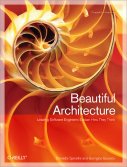 The book
Beautiful Architecture: Leading Thinkers Reveal the Hidden Beauty in Software Design (http://oreilly.com/catalog/9780596517984/)
(O'Reilly, 2008,
ISBN 9780596517984)
co-edited by Georgios Gousios
obtained the top rank on the amazon.co.uk Software Architecture books category.
The book's royalties are donated to the
international humanitarian aid organisation
Médecins Sans Frontières (http://www.msf.org/).
The book
Beautiful Architecture: Leading Thinkers Reveal the Hidden Beauty in Software Design (http://oreilly.com/catalog/9780596517984/)
(O'Reilly, 2008,
ISBN 9780596517984)
co-edited by Georgios Gousios
obtained the top rank on the amazon.co.uk Software Architecture books category.
The book's royalties are donated to the
international humanitarian aid organisation
Médecins Sans Frontières (http://www.msf.org/).
- February 2009
-
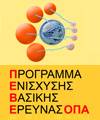 Vassilis Karakoidas is awarded funding for his research through
AUEB's Funding Programme for Basic Research (PEVE).
Vassilis Karakoidas is awarded funding for his research through
AUEB's Funding Programme for Basic Research (PEVE).
- January 2009
- Dimitris Mitropoulos publishes a paper in a high-impact journal: SDriver: Location-specific signatures prevent SQL injection attacks. Computers and Security, 2009.
- October 13th, 2008
- Vasileios Vlachos is elected Lecturer in the Department of Computer Science and Telecommunications at the Technological Educational Institution of Larissa. The subject of his post is the Development and Security of Internet Applications.
- September 2008
- Vasileios Vlachos publishes a paper he co-autored during his PhD study in a top-impact journal: Power laws in software. ACM Transactions on Software Engineering and Methodology, 18(1):1–26, September 2008. Article 2.
- June 2008
-
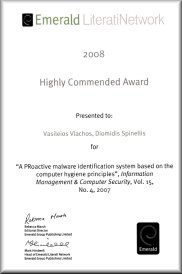 The paper
A PRoactive
Malware Identification System based on the Computer Hygiene Principles
(Information Management and Computer Security, 15(4):295-312, 2007)
co-authored by Vasileios Vlachos
was awarded (http://info.emeraldinsight.com/authors/literati/awards.htm?jr=imcs)
by
Emerald (http://www.emeraldinsight.com/)
publishers with the
"Highly Commended Paper" distinction.
The award was given by the journal's editorial board to three papers
as part of the
"Literati Network Awards for Excellence 2008".
The paper
A PRoactive
Malware Identification System based on the Computer Hygiene Principles
(Information Management and Computer Security, 15(4):295-312, 2007)
co-authored by Vasileios Vlachos
was awarded (http://info.emeraldinsight.com/authors/literati/awards.htm?jr=imcs)
by
Emerald (http://www.emeraldinsight.com/)
publishers with the
"Highly Commended Paper" distinction.
The award was given by the journal's editorial board to three papers
as part of the
"Literati Network Awards for Excellence 2008".
- May 2008
- Vassilis Karakoidas publishes a paper in a high-impact journal: FIRE/J — optimizing regular expression searches with generative programming. Software: Practice & Experience, 38(6):557–573, May 2008.
- November 17th, 2007
-
 Konstantinos Chorianopoulos is elected Lecturer in the
Department of Informatics at the Ionian University.
Konstantinos Chorianopoulos is elected Lecturer in the
Department of Informatics at the Ionian University.
- July 24th, 2007
-
 Vasileios Vlachos successfully defends his PhD thesis.
Vasileios Vlachos successfully defends his PhD thesis.
- April 2006
-
The paper
A
survey of peer-to-peer content distribution technologies
(ACM Computing Surveys, 36(4):335–371, December 2004)
co-authored by Stephanos Androutsellis Theotokis
obtained the top yearly download rank in the ACM's digital library
popular magazine and computing surveys articles category.
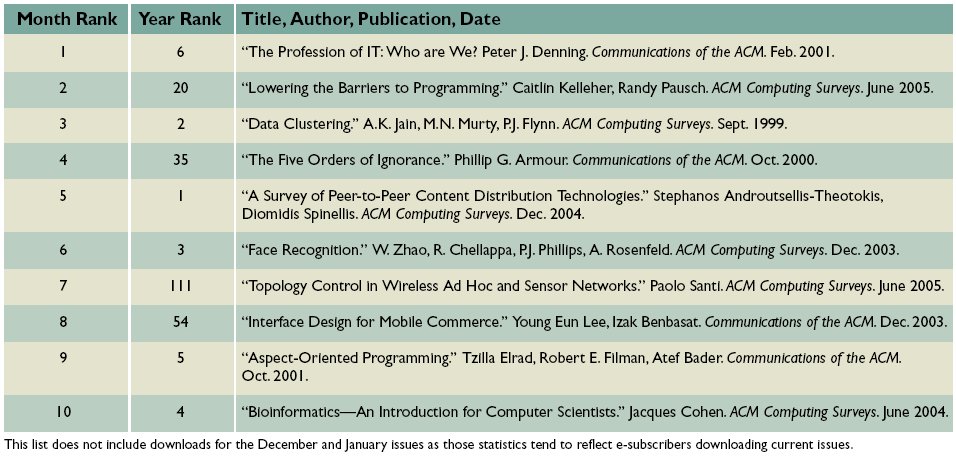
Table from the Communications of the ACM Volume 49, Number 4 (2006), Pages 29-30. - January 2006
-
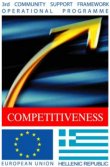 Stephanos Androutsellis Theotokis,
Georgios Gousios, and
Konstantinos Stroggylos
are awarded a scholarhip through the
framework of the "Reinforcement Programme of Human Research Manpower"
(PENED) co-financed by National and Community Funds
(25% from the Greek Ministry of Development-General Secretariat of Research and Technology and 75% from E.U.-European Social Fund).
Stephanos Androutsellis Theotokis,
Georgios Gousios, and
Konstantinos Stroggylos
are awarded a scholarhip through the
framework of the "Reinforcement Programme of Human Research Manpower"
(PENED) co-financed by National and Community Funds
(25% from the Greek Ministry of Development-General Secretariat of Research and Technology and 75% from E.U.-European Social Fund).
- December 2004
- Stephanos Androutsellis Theotokis publishes a paper in a top-impact journal: A survey of peer-to-peer content distribution technologies. ACM Computing Surveys, 36(4):335–371, December 2004.
- July 2004
-
Vasileios Vlachos is awarded a scholarship
co-funded by the European Social Fund and National Resources - EPEAEK II -
IRAKLITOS Fellowships for research of
Athens University of Economics and Business.

- June 2004
- Vasileios Vlachos and Stefanos Androutsellis Theotokis publish a paper in a high-impact journal: Security applications of peer-to-peer networks. Computer Networks, 45(2):195–205, June 2004.
- May 10th, 2004
-
 Konstantinos Chorianopoulos successfully defends his PhD thesis.
Konstantinos Chorianopoulos successfully defends his PhD thesis.
- May 2004
- Konstantinos Chorianopoulos publishes a paper in a high-impact journal: User interface development for interactive television: Extending a commercial DTV platform to the virtual channel API. Computers & Graphics, 28(2):157–166, April 2004.
- April 2004
-
 Vasileios Vlachos coordinated the student team that won the third place
in the national phase of the Microsoft Imagine Cup 2004 competition.
Vasileios Vlachos coordinated the student team that won the third place
in the national phase of the Microsoft Imagine Cup 2004 competition.
- December 2004
-
The paper
A
survey of peer-to-peer content distribution technologies
(ACM Computing Surveys, 36(4):335–371, December 2004)
co-authored by Stephanos Androutsellis Theotokis
obtained the top monthly download rank in the ACM's digital library
popular magazine and computing surveys articles category.
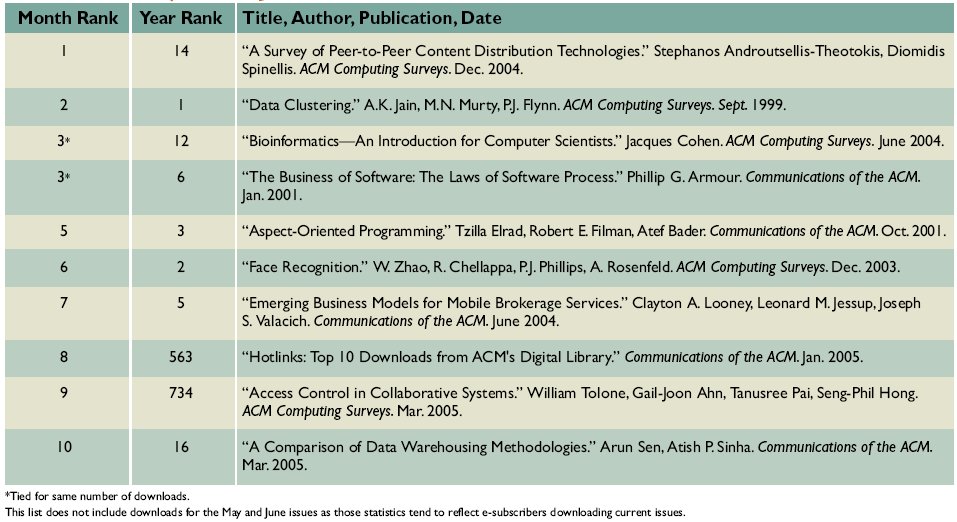
Table from the Communications of the ACM Volume 48, Number 9 (2005), Pages 29-30. - June 16th, 2002
-
 Konstantinos Raptis successfully defends his PhD thesis.
Konstantinos Raptis successfully defends his PhD thesis.
- June 2000
- Konstantinos Raptis publishes a paper in a high-impact journal: Component mining: A process and its pattern language. Information and Software Technology, 42(9):609–617, June 2000.
The PhD Game
|
0. |
The Ph.D Game |
|||||
|
1. |
2. |
3. |
4. |
5. Go to Library -you can't understand catalogue! |
6. The important reference has gone missing in the lib. Back 2 spaces. |
7. |
|
14. |
13. |
12. |
11. |
10. |
9. Supervisor makes a comment you don't understand. Go back two spaces |
8. |
15. |
16. |
17. |
18. Change supervisor. |
19. Do lab demonstra -tions to get some dosh. |
20. |
21. Lab demos take up too much of your time. |
|
28. You begin to think you will never finish. You are probably right. |
27. |
26. |
25. |
24. |
23. |
22. |
29. |
30. You spend more time complaining than working. Miss 1 turn. |
31. You realise your mates are earning 5 times your grant. Have a good cry |
32. You are asked why you started a PhD. Miss a turn finding a reason |
33. You are offered a job. You may cont. or retire from game. |
34. Start writing up. Now you are really depressed. |
35. |
42. Your PhD is awarded. |
41. You are asked to resubmit thesis. |
40. You decide PhD isn't worth the bother. |
39. |
38. It proves impossible to write up and work. |
37. Your thesis will disprove external examiners work. Go back to 28. |
36. Your data has just been published by rival group. |
The Nine Types of Principal Investigators
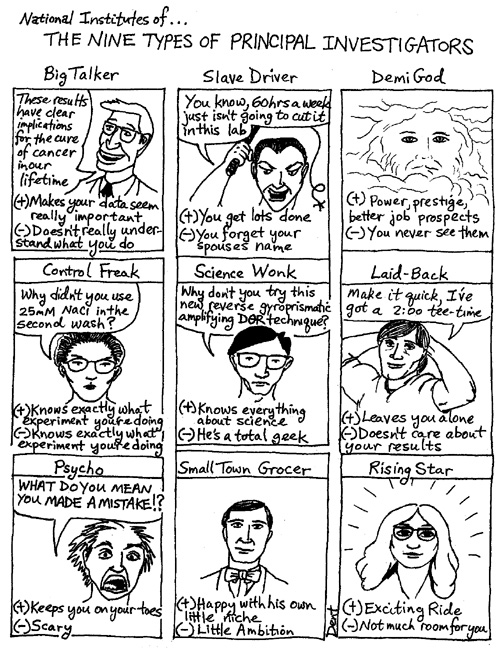 From The NIH Catalyst, Volume 3, page 23.
From The NIH Catalyst, Volume 3, page 23.
Delaying Higher Degree Completion
Collated by Diana Bental (D.Bental@lancaster.ac.uk) with the help of contributions from many PhD students, past and present.
Purpose
This document is intended for supervisors of students registered for higher degrees in just about any University department anywhere.
Though the presentation of the document is deliberately light in tone, the contents are based on a collation of feedback from a fairly large number of students currently pursuing their studies for a Ph.D.
Acknowledgement
This document is extremely close to that published in the AISB Quarterly (No. 80, Summer 1992), the quarterly magazine of the Society for the Study of Artificial Intelligence and the Simulation of Behaviour. It has been slightly edited by Paul Brna.
``All the information here has in fact been contributed by PhD students, past and present. Much of what is written here has been exaggerated for effect, but it is all based on students' real experiences and some of it is no more than a literal description of what has happened to them.'' (page 60, AISBQ No 80, Summer 1992)
Many PhD students have collaborated to provide the insights that are found within. Our thanks go to them, and to those that helped in pulling the contributions together into such a formidable body of knowledge.
Thesis Prevention: Advice to Supervisors
As you will be aware, Professor Hacker in his wisdom supervises a great many Higher degree students. Prof Hacker is currently angling for research money for his Automated Thesis Adviser, and it is his aim that no student of his should do anything which requires any input from him until he has obtained the grant for, researched, developed and completed the Automated Thesis Adviser which will replace him.Clearly, it is not easy to prevent reasonably intelligent and mildly motivated students (such as ourselves) from producing useful work. Nevertheless, he has developed some excellent techniques for Thesis Prevention which we feel may be of use to others, and which we, Professor Hacker's research students present here for your enlightenment and entertainment. If you, as a supervisor, wish to prevent your students from researching and writing up a thesis, or indeed doing anything useful at all, we hope you will take inspiration from Prof. Hacker's example.
On Arrival: Settling In
Try to be away when the student arrives. Out of the country is preferable, but in today's economic climate Prof. Hacker acknowledges that it is also acceptable to be merely in another city. In this case, your student cannot try to set up any kind of regular contact with you, and will be forced to become independent of you early on.
Supervisions
Initially, Prof. Hacker attempted to shelve the whole problem of supervisions by simply refusing to see his students at all. He would smile at them on his way out of the tea room, realising that this was as much supervision as any student could expect, especially if he occasionally discussed the weather with them when meeting in the corridor. He was forced to drop this approach when his department laid down some guidelines which insisted that supervisors should actually sit down in the same room as students every few weeks and discuss the students' work. This was only a temporary setback to the intrepid Prof. Hacker, of the sort that spurs a good researcher on to new heights. It was at this point that he made some stunning discoveries about how to use these meetings to achieve depths of demotivation previously beyond human imagining.
Basic Etiquette
Here are some guidelines which, if adhered to strictly for even quite a short time, will convey the desired message to the student: a student's work is unimportant, uninteresting and not worth anybody's time, not even their supervisor's.
Punctuality
Arrive late for all appointments with the student. If you can't manage that, then be occupied in some long and complicated task when the student arrives and be sure to finish the task before turning your attention to the student.
Concentration
Encourage interruptions. Do not cut callers short with the rude statement that you are in a meeting. Never re-route telephone calls. Ask the secretaries to route all their calls through your office as a return favour for all those times you've re-routed your calls. Encourage your head of department, researchers from overseas and your three-year-old child to call at these times. Make any outgoing calls that you suddenly realise are necessary.
If supervisions are held in your office (and they needn't be) make sure that you have a keyboard handy. This is so that you can, in the middle of any detailed explanations that your student may indulge in, reach for the keyboard and read your mail. Prof. Hacker likes to get his workstation to emit distracting beeps at random intervals.
Reliability
Cancel meetings frequently on the flimsiest pretexts that you can. Do not ever tell students that the meeting is cancelled, but let them come prepared for a supervision and find the room empty. (If the students have prepared for the supervision, that is 90 per cent of the benefit anyway, so don't feel that you are depriving them.)
The Group Supervision
Try as far as possible to conduct the supervision of several students simultaneously. The students can talk to each other, thus decreasing your need to contribute. If they are all working on unrelated projects and share no common terminology, their attempts to hold a useful discussion should provide you with much diversion.
Productivity is increased even further if this is done as a lunch-time exercise. After all, you have to eat sometime, and if you can do this and fulfill your obligations to your students at the same time, so much the better.
Prof. Hacker warns that only experienced supervisors should attempt simultaneous supervision of more than two students. Note also that fewer than two is really not cost effective and in this case you should try to turn up as late as possible, grab your lunch and be busy eating for most of the next 15 minutes (which is the recommended duration for such supervisions).
Preparing for Supervisions
Do not prepare for any supervision. If you have an excellent memory, know all the background to the student's project and see the student often, then this technique will not help you. But if not, then your failure to take note of what the student has been doing and/or your failure to look back over your notes will enable you to start each supervision from scratch, requiring the student to explain and justify every step of background to their work before they can discuss any real problems with you. Do this one well enough and you will never have to discuss any real technical problems with your student.
Content of Supervisions
You will find that you are expected to talk during supervisions. Prof. Hacker prefers to avoid the strain of listening critically to students' ideas, and still more to avoid the strain of thinking up helpful and detailed advice.
Avoid at all times any discussion of practical possibilities. Inspire the student by using supervision meetings to soliloquise on all your vaguest and most esoteric ideas, particularly on philosophical issues. Tell lengthy anecdotes to illustrate a point which the student will have forgotten by the time you finish.
Your students will also expect you to respond to their ideas. Prof. Hacker has demonstrated that three quite different techniques may be expected to produce the same effect.
- Always agree with any suggestions a student makes. At first, this
will boost their confidence beyond their wildest expectations
which means they won't come back for supervision for a long time. The
next time you use this approach they will become suspicious that
whatever they say is enthusiastically accepted, however ludicrous, so
they won't come for supervision since they don't trust you.
- Always disagree with what the student says. This is more
dangerous since it is confrontational and so should only be attempted
by persons of large stature or with a black belt in an appropriate
martial art. A good way of ridding yourself of students with the
possibility of unlimited earnings from suing for assault. If you have
been unable to prevent a student from progressing deeply into a
thesis, you can discourage the student by commenting only on the weak
aspects of the work and assuming that the student will know, perhaps
by psychic projection, that you think the rest is good.
- Maintain a strict neutrality to avoid unfairly influencing the
student. This is far less obvious than either of the two previous
approaches and it still frees you from having to think about what the
student is doing. Never give clear approval or disapproval of any
ideas the student comes up with, so that they don't know if the idea
should be followed up or abandoned. The student, unlike you, is
unfamiliar with doing a Higher Degree, so it would be unfair to bias
their ideas of what is appropriate.
Research Guidance
Directing the Area and Scope of your Students' Research
A good way to prevent your students from doing any useful research is to ensure that they choose the right topic. An ideal topic is one that the student isn't interested in, and that the supervisor knows nothing about. Prof. Hacker is especially pleased with a topic if the department lacks the facilities required to pursue it, and if any results are likely to be inconclusive.
The department accidentally played right into Prof. Hacker's hands when it instigated the requirement that students submit a thesis proposal at the end of their first year. A feebler supervisor would have given in and tried to ensure that students produce a detailed and well thought out proposal by this deadline. Prof. Hacker is made of sterner stuff. By following techniques given in this section and the reading techniques given in the section below throughout his students' first year, Prof. Hacker was able to use this deadline to panic his students into choosing the right sort of topic - for his purposes.
Discourage students from following up their initial interests. Post-graduate work is a chance to explore new areas! Suggest subject areas that they know nothing about, so that they spend a year or two trying to understand an area before they find out that it's not worth the trouble to pursue.
Suggest that the student should apply a promising technique to a useless area, such as applying termination proof theory to Cobol programs.
Suggest that students should research a `related' area to their current research since the two areas share a common word in their titles, even though they are lightyears apart (see the following section on reading). This could set them on the wrong track for years.
Wait a year or two and then find a good reason why it would be pointless for the student to continue their current line of research. Refer them to the paper that reports someone else having done the work they intend to do, or explain that the equipment or facilities that the project depends upon will be unavailable. Remember that just because you know that a research group of thirty staff is working on a topic that your student is investigating alone, or that your equipment bid is unlikely to be funded, you don't have to tell the student immediately. You wouldn't want to discourage them, after all.
Finally, gild the lily. Prof. Hacker is delighted to report that having been initially sceptical about a student's choice of project and having suggested that the student spend several months preparing some alternative proposals, he was able to inform the student that the student's original proposal was indeed the best.
Directing the Student's Reading
Guidance on reading is vital. Prof. Hacker's aim is to ensure that his students' reading lists increase in length exponentially.
If ever a student raises an interesting point that Prof. Hacker fears might lead to a technical discussion, he exclaims ``Ah yes, you really must read what Whizzbang and Genius have to say about that in their theses at the University of Obscurity, Darkest Peru in about, oh, 1965''. He makes it quite clear that there is no point discussing the topic further until the student has read the vital reference (or better still, five or six of them).
The choice of reference material should be guided by a generate and test procedure. Prof. Hacker generates appropriate reference material by looking for titles that share a common word with the student's topic regardless of context. He filters out inappropriate references by making sure that all the references he gives are very hard to dig out. (Never actually produce one to lend to your students, for students are independent researchers who must not be spoon-fed.) Prof. Hacker prefers to mention theses done in remote corners of the world and of 1960s or 70's vintage.
The consistent application of these guidelines should put the student into a sufficiently desperate state that they will settle on a completely inappropriate topic when they have to write their thesis proposal (as discussed in the previous section).
Writing Up
If your students get this far (and if you follow all our guidelines strictly, we trust that your students will not), you will need to assist your students and ensure that they never finish writing up. Prof. Hacker takes care to identify every concept referred to in his students' work and reminds students that there must be a background chapter on each concept in the thesis, with accompanying related work section. As the size of this grows (we suspect factorially, see our appendix on complexity theory) that is a very off-putting task. If a student actually attempts the task it is guaranteed to produce a nervous breakdown, as each of these background chapters then requires further elaboration in itself, and so on recursively.
Reading
Students will expect that you will read technical papers that they have written, however badly worded, boring and pointless they may be. There are two main approaches to preventing students from giving you things to read. Applied with sufficient vigour they may prevent your student from ever writing anything at all.
- Do not write comments on anything that the student has written.
This conveys the impression that you have not read the paper without
providing the student with any concrete evidence that could be used
against you. You can make verbal comments. These give the impression
that yes, you did read the paper but you found it too pointless to be
worth searching for a pencil. If you wish to convey the impression
that you read the paper with pencil in hand and thought nothing of the
contents, you can simply dip into the middle of the paper and correct
a minor grammatical error.
- Allow several months to elapse before reading (or claiming to have
read) anything the student writes. This is risky with drafts of
conference papers which may have a deadline for submission, but is an
adequate way to deal with thesis chapters, thesis proposals and other
half-baked nonsense. This method is especially useful when applied
to something that you have asked the student to write.
Prof. Hacker occasionally takes a more subtle approach, in which comments are always written but are content free or (better still) ambiguous, thus leaving the student with the work of incorporating the wrong ideas into their paper.
If Prof. Hacker makes any comments on style or content, e.g. that some sentence should be re-written in a particular way, Prof. Hacker tries to remember to reverse the comments in the next draft. This can be applied ad infinitum, or at least until he forgets to do it.
Publications
Prof. Hacker believes that it is an excellent idea for a supervisor to add his or her name to all of a student's published work. This is justified for two reasons. Firstly, you are doing the student a favour because you are a more famous researcher and therefore your name as co-author will mean that the paper is more likely to be accepted. Secondly, you are the student's supervisor and therefore you are naturally the inspiration for everything the student publishes. This will delight the student even further if you have been practising all the other the techniques proposed here, especially those suggested in the section on reading.
Extra-Mural Activities
All supervisors should encourage their students to make contacts in other institutions and to broaden their range of interests. The ideal way to do this is to ask students to organise a conference or workshop, preferably on a topic unrelated to their thesis work.
Conclusions
We believe that we have gathered together a collection of techniques that will be of widespread use in the slowing down and prevention of the production of theses for Higher Degrees. We have emphasised the many ways in which a supervisor can contribute, and the great variety of approaches to the prevention of theses. Finally, we would like to think that Professor Hacker's supervision techniques were unique to him but we fear that they are not.
A Letter Regarding Attendance Time
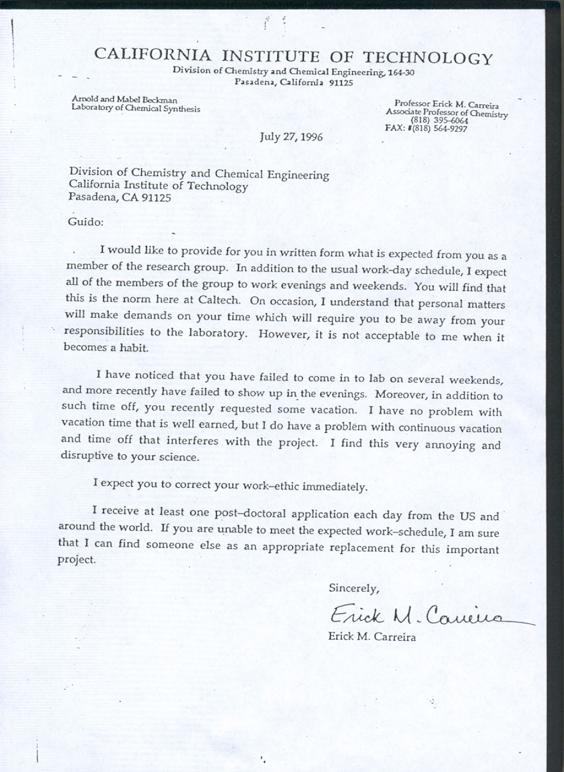 And, yes, the receipient was a former student (http://www.carreira.ethz.ch/people/former_members).
(From the web page of Jinghai Rao (http://www.cs.cmu.edu/~jinghai/),
brought to my attention by
Vassilis Prevelakis (http://vp.cs.drexel.edu/).)
And, yes, the receipient was a former student (http://www.carreira.ethz.ch/people/former_members).
(From the web page of Jinghai Rao (http://www.cs.cmu.edu/~jinghai/),
brought to my attention by
Vassilis Prevelakis (http://vp.cs.drexel.edu/).)
189 Things (Not) to Do at or for your Thesis Defense (in no particular order)
From: mnsotn#NoSpam.picard.cs.wisc.edu (Christopher Bovitz)From The NIH Catalyst, Volume 3, page 23.
Written by Peter Dutton, Jim Lalopoulos, Alison Berube, and Jeff Cohen,
grad students extrordiannaire (#1 - 101).
Appended by Chris Bovitz, grad student grandioso (#102-131).
(#132 from Mary C. Liles).
Patricia Whitson and a few others (#130-...)
- "Ladies and Gentlemen, please rise for the singing of our National Anthem..."
- Charge 25 cents a cup for coffee.
- "Charge the mound" when a professor beans you with a high fast question.
- Interpretive dance.
- "Musical accompaniment provided by..."
- Stage your own death/suicide.
- Lead the specators in a Wave.
- Have a sing-a-long.
- "You call THAT a question? How the hell did they make you a professor?"
- "Ladies and Gentlemen, as I dim the lights, please hold hands and concentrate so that we may channel the spirit of Lord Kelvin..."
- Have bodyguards outside the room to "discourage" certain professors from sitting in.
- Puppet show.
- Group prayer.
- Animal sacrifice to the god of the Underworld.
- Sell T-shirts to recoup the cost of copying, binding, etc.
- "I'm sorry, I can't hear you - there's a banana in my ear!"
- Imitate Groucho Marx.
- Mime.
- Hold a Tupperware party.
- Have a bikini-clad model be in charge of changing the overheads.
- "Everybody rhumba!!"
- "And it would have worked if it weren't for those meddling kids..."
- Charge a cover and check for ID.
- "In protest of our government's systematic and brutal oppression of minorities..."
- "Anybody else as drunk as I am?"
- Smoke machines, dramatic lighting, pyrotechnics...
- Use a Super Soaker to point at people.
- Surreptitioulsy fill the room with laughing gas.
- Door prizes and a raffle.
- "Please phrase your question in the form of an answer..."
- "And now, a word from our sponsor..."
- Present your entire talk in iambic pentameter.
- Whine piteously, beg, cry...
- Switch halfway through your talk to Pig Latin. Or Finnish Pig Latin.
- The Emperor's New Slides ("only fools can't see the writing...")
- Table dance (you or an exotic dancer).
- Fashion show.
- "Yo, a smooth shout out to my homies..."
- "I'd like to thank the Academy..."
- Minstrel show (blackface, etc.).
- Previews, cartoons, and the Jimmy Fund.
- Pass the collection basket.
- Two-drink minimum.
- Black tie only.
- "Which reminds me of a story - A Black guy, a Chinese guy, and a Jew walked into a bar..."
- Incite a revolt.
- Hire the Goodyear Blimp to circle the building.
- Release a flock of doves.
- Defense by proxy.
- "And now a reading from the Book of Mormon..."
- Leave Jehovah's Witness pamphlets scattered about.
- "There will be a short quiz after my presentation..."
- "Professor Robinson, will you marry me?"
- Bring your pet boa.
- Tell ghost stories.
- Do a "show and tell".
- Food fight.
- Challenge a professor to a duel. Slapping him with a glove is optional.
- Halftime show.
- "Duck, duck, duck, duck... GOOSE!"
- "OK - which one of you farted?"
- Rimshot.
- Sell those big foam "We're number #1 (sic)" hands.
- Pass out souvenier matchbooks.
- 3-ring defense.
- "Tag - you're it!"
- Circulate a vicious rumor that the Dead will be opening, making sure that it gets on the radio stations, and escape during all the commotion.
- Post signs: "Due to a computer error at the Registrar's Office, the original room is not available, and the defense has been relocated to Made-up non-existent room number)"
- Hang a pinata over the table and have a strolling mariachi band.
- Make each professor remove an item of clothing for each question he asks.
- Rent a billboard on the highway proclaiming "Thanks for passing me Professors X,Y, and Z" - BEFORE your defense happens.
- Have a make-your-own-sundae table.
- Make committee members wear silly hats.
- Simulate your experiment with a virtual reality system for the spectators.
- Do a soft-shoe routine.
- Throw a masquerade defense, complete with bobbing for apples and pin-the-tail-on-the-donkey.
- Use a Greek Chorus to highlight important points.
- "The responsorial psalm can be found on page 124 of the thesis..."
- Tap dance.
- Vaudeville.
- "I'm sorry Professor Smith, I didn't say 'SIMON SAYS any questions?'. You're out."
- Flex and show off those massive pecs.
- Dress in top hat and tails.
- Hold a pre-defense pep rally, complete with cheerleaders, pep band, and a bonfire.
- Detonate a small nuclear device in the room. Or threaten to.
- Shadow puppets.
- Show slides of your last vacation.
- Put your overheads on a film strip. Designate a professor to be in charge of turning the strip when the tape recording beeps.
- Same as #88, but instead of a tape recorder, go around the room making a different person read the pre-written text for each picture.
- "OK, everybody - heads down on the desk until you show me you can behave."
- Call your advisor "sweetie".
- Have everyone pose for a group photo.
- Instant replay.
- Laugh maniacally.
- Talk with your mouth full.
- Start speaking in tongues.
- Explode.
- Implode.
- Spontaneously combust.
- Answer every question with a question.
- Moon everyone in the room after you are done.
- Rearrange the chairs into a peace symbol.
- Refer to yourself in the third person, like Julius Caesar did.
- Mention your professor as "my helper."
- Say that you'd like to thank a few people. Pull out the White Pages. Start reading.
- Advertise it as "pot luck".
- Talk in Klingonese.
- Dress like your favorite character from "Star Trek".
- Ask imaginary helpers to change transparencies; fly off the handle when they don't.
- Wear a trenchcoat. And nothing else.
- Dress in a Wild West style.
- Go dressed in scuba gear. Use the oxygen tank.
- Preface with the story of your life.
- Wear a swimsuit from the opposite sex: man - wear a bikini, woman - wear trunks.
- Have bodyguards on your sides as you talk. The bigger, the better. Have a questioner thrown out "as an example."
- Have someone wheel in a big cake with you in it. Jump out and begin.
- Perform your defense as a Greek tragedy, kill yourself offstage when you're done.
- Half way through, break down. Go to your professor, curl up on his or her lap and call him or her "Mommy". Suck your thumb.
- Suddenly develop Turret's Syndrome.
- Suddenly develop the China Syndrome.
- "This defense has been sponsored by the fine people at (your favorite corporation)..."
- Secede from the U.S. Give yourself political asylum.
- Talk in Canadianese - add an "eh" after every sentence.
- When a professor asks you a question, argue with your imaginary twin over the final answer.
- Videotape it ahead of time, and get someone set it up to show. Come in the back and sit there. When your tape is done, ask for questions. In person.
- Have every person pick a "CB" handle. Enforce their usage. Talk in CB lingo. End every statement with "good buddy." End every question with "over."
- Provide party favors. Noisy ones.
- Frequently ask if anyone has to go to the potty.
- Mention that you have to hurry because "Hard Copy" is on in 15 minutes.
- Dress like your school mascot.
- Urge your committee that if they like your defense enough to tell two friends, and then they'll tell two friends, and so on, and so on...
- Show up in drag accompanied by the Drag Queens you met at last night's performance and proclaim your thesis presentation will instead discuss: "Blue Eyeshadow: Our Friend Or Foe?" From: smitch#NoSpam.alcor.concordia.ca (Sidney N. Mitchell)
- Plead the fifth ammendment if you can't answer a question.
- Keep your back to the committee during the presentation and defense phases.
- Answer only questions that begin with sir and end with sir. (tell your committe this beforehand).
- Limit the number of questions that you will allow, and then when the limit is almost reached, go into aerobics terminology... four more...three more...two more..and...rest.
- Ignore the committee and say "I think that young man/lady at the back has a question".
- Have your parents call your committee members repeatedly the week before your defense to tell them how expensive it is putting a child through graduate school etc.
- At the defense, have your parents sit directly behind your committee.
- Burp, pass gas, scratch (anywhere repeatedly), and pick your nose.
- "Laugh, will you? Well, they laughed at Galileo, they laughed at Einstein..."
- Hand out 3-D glasses.
- "I'm rubber, you're glue..."
- Go into labor (especially for men).
- Give your entire speech in a "Marvin Martian" accent.
- "I don't know - I didn't write this."
- Before your defense, build trapdoors underneath all the seats.
- Swing in through the window, yelling a la Tarzan.
- Lock the department head and his secretary out of the defense room. And the coffee lounge, the department office, the copy room, and the mail room. Heck, lock them out of the building. And refuse to sell them stamps. (NOTE: This is an inside gripe, based on conditions that existed in the ME department at WPI while we were there. Sorry.)
- Roll credits at the end. Include a "key grip", and a "best boy".
- Hang a disco ball in the center of the room. John Travolta pose optional.
- Invite the homeless.
- "I could answer that, but then I'd have to kill you"
- Hide.
- Get a friend to ask the first question. Draw a blank-loaded gun and "shoot" him. Have him make a great scene of dying (fake blood helps). Turn to the stunned audience and ask "any other wise-ass remarks?"
- Same as #154, except use real bullets.
- "Well, I saw it on the internet, so I figured it might be a good idea..."
- Wear clown makeup, a clown wig, clown shoes, and a clown nose. And nothing else.
- Use the words "marginalized", "empowerment", and "patriarchy".
- Play Thesis Mad Libs.
- Try to use normal printed paper on the overhead projector.
- Do your entire defense operatically.
- Invite your parents. Especially if they are fond of fawning over you. ("We always knew he was such an intelligent child")
- Flash "APPLAUSE" and "LAUGHTER" signs.
- Mosh pit.
- Have cheerleaders. ("Gimme an 'A'!!")
- Bring Howard Cosell out of retirement to do color commentary.
- "I say Hallelujah, brothers and sisters!"
- Claim political asylum.
- Traffic reports every 10 minutes on the 1's.
- Introduce the "Eyewitness Thesis Team". Near the end of your talk, cut to Jim with sports and Alison with the weather.
- Live radio and TV coverage.
- Hang a sign that says "Thank you for not asking questions"
- Bring a microphone. Point it at the questioner, talk-show style.
- Use a TelePromTer
- "Take my wife - please!"
- Refuse to answer questions unless they phrase the question as a limerick.
- Have everyone bring wine glasses. When they clink the glasses with a spoon, you have to kiss your thesis. Or your advisor.
- Offer a toast.
- Firewalk.
- Start giving your presentation 15 minutes early.
- Play drinking thesis games. Drink for each overhead. Drink for each question. Chug for each awkward pause. This goes for the audience as well.
- Swoop in with a cape and tights, Superman style.
- "By the power of Greyskull..."
- Use any past or present Saturday Night Live catchphrase. Not.
- Stand on the table.
- Sell commercial time for your talk and ad space on your overheads.
- Hold a raffle.
- "You think this defense was bad? Let me read this list to show you what I COULD have done..."